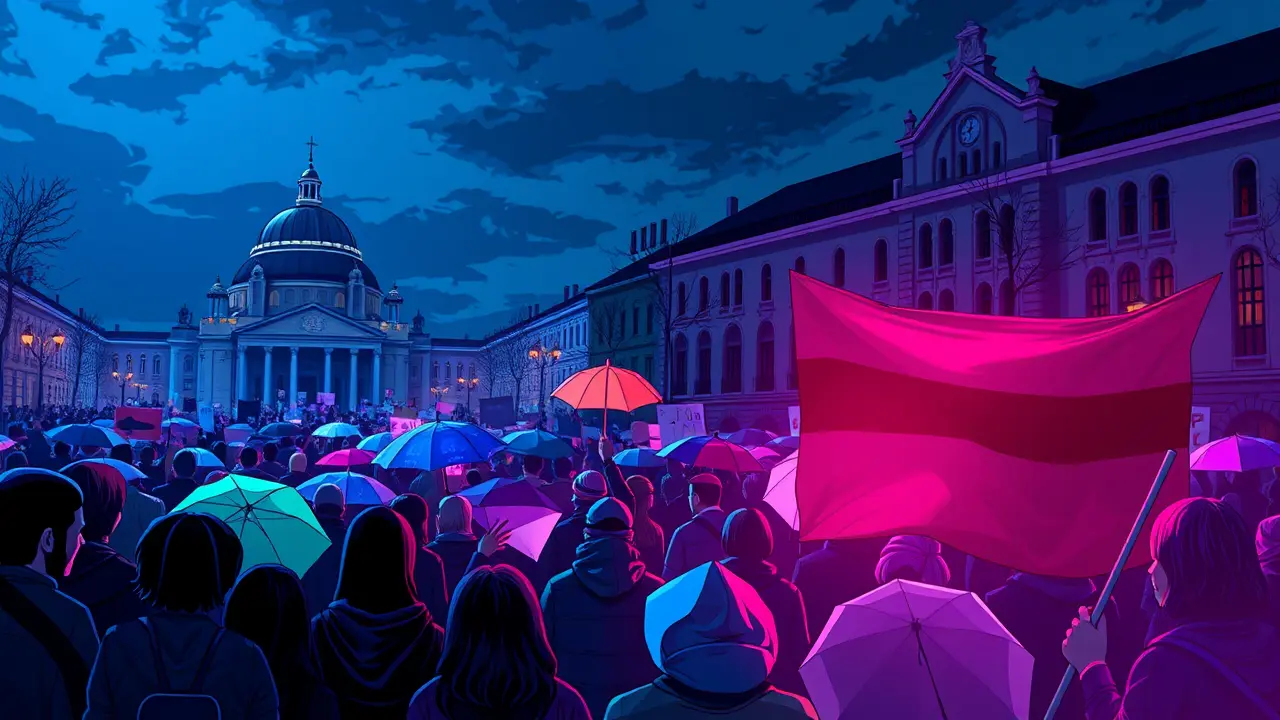
Politicsprotests & movements
Latvia votes to withdraw from women's violence protection treaty.
AN
Anna Wright
2 days ago7 min read
In a move that has sent shockwaves through the international human rights community and sparked significant domestic outcry, Latvia’s parliament, the Saeima, has voted to initiate a withdrawal from the Council of Europe Convention on Preventing and Combating Violence against Women and Domestic Violence, a landmark treaty more widely known as the Istanbul Convention. This decision, landing with the thud of a heavy historical door slamming shut, places the small Baltic nation on a precarious path, positioning it to become the first and only European Union member state to abandon this crucial legal framework designed specifically to protect women from the pervasive scourge of gender-based violence.The parliamentary vote was met with immediate and visceral opposition; several thousand protestors, a sea of umbrellas and determined faces braving the elements, gathered in the historic heart of Riga, their chants and placards forming a powerful, living rebuttal to the politicians inside. They carried signs with slogans like 'I Am Next' and 'Protect Women, Not Abusers,' their collective voice a stark reminder that this is not an abstract political debate but a matter of life and death for countless women and children.The convention, which Latvia originally ratified in 2021, represents the most comprehensive legal instrument on the continent for tackling this specific form of violence, establishing clear, binding standards for prevention, protection of victims, and prosecution of perpetrators. It is groundbreaking precisely because it explicitly frames violence against women as a violation of human rights and a manifestation of historically unequal power relations between women and men, a conceptual framing that has become the central flashpoint for its opponents.Critics, often from conservative and nationalist political factions, have launched a disinformation campaign, falsely alleging that the treaty's core concept of 'gender' is a nebulous, dangerous ideology that secretly seeks to deconstruct the traditional family and impose 'LGBT propaganda' on society. This strategic misrepresentation, a chillingly effective political gambit seen from Hungary to Poland, has successfully diverted the conversation away from the convention's actual, life-saving provisions—such as funding for shelters, 24/7 helplines, and specialized police training—and into a manufactured culture war over identity and sovereignty.Proponents of the withdrawal argue they are defending 'national values’ from undefined foreign influences, a rhetorical shield that crumbles under the weight of the statistics: according to a recent EU-wide survey, nearly half of all women in Latvia have experienced physical or sexual violence since the age of 15, a rate significantly higher than the EU average. The fate of the convention now rests entirely in the hands of President Edgars Rinkēvičs, a figure known for his pro-Western stance and who now faces a profound test of leadership and principle.He must decide whether to promulgate the law, making Latvia a pariah in the eyes of European gender equality advocates, or to exercise his veto power and send it back to the Saeima for reconsideration, a move that would trigger a fierce constitutional and political standoff. His decision will be scrutinized not just in Riga and Brussels, but in Moscow and Minsk, where authoritarian regimes are keenly watching for any sign of fragmentation within the Western democratic alliance, especially on socially divisive issues.The potential consequences of a full withdrawal are dire and tangible: it could jeopardize access to EU funding streams earmarked for projects combating gender-based violence, undermine cross-border cooperation in prosecuting offenders, and, most critically, send a devastating message to victims that their state is retreating from its commitment to their safety. This is not merely a legal technicality; it is a profound moral and political choice that will define Latvia's identity for a generation, pitting a regressive, sovereignty-obsessed nationalism against the universal, indivisible principles of human rights and bodily autonomy that form the bedrock of the European project it so proudly joined.
#Latvia
#women's rights
#treaty withdrawal
#protests
#human rights
#featured
Stay Informed. Act Smarter.
Get weekly highlights, major headlines, and expert insights — then put your knowledge to work in our live prediction markets.
Comments
It’s quiet here...Start the conversation by leaving the first comment.
© 2025 Outpoll Service LTD. All rights reserved.